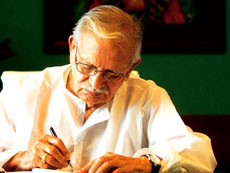 NEW DELHI: Veteran lyricist Gulzar has come out with his debut novel in English which examines the status of refugees after the Partition.
NEW DELHI: Veteran lyricist Gulzar has come out with his debut novel in English which examines the status of refugees after the Partition.
“Two” was originally written in Urdu, Gulzar’s medium of writing.
“But then, it included many words and phrases in Punjabi, Saraiki and other dialects spoken in that area of Punjab which became Pakistan after Partition. I belong to that area,” he says.
Gulzar was born in Dina, in the city of Jhelum, which is pronounced ‘Jehlum’ colloquially.
Translating the novel into English became a bit of a hurdle, says the Dada Saheb Phalke winner. Two of his friends Sukrita Paul and Shantanu Ray Chaudhuri tried but Gulzar was not happy with the outcome.
“It didn’t read like it read in Urdu, blending the tones and dialects I had used in the narrative,” he says. It was then that he decided to work on the translation himself.
“You may not find ‘perfect’ or ‘proper’ English in it, but you will find stories of refugees, and how life planted them all over the world. A lot of Sukrita’s translated lines have remained in this. So have those of Shantanu’s,” he says about his effort.
But perfectionist Gulzar is still “not at ease” with his version. “But then, I wanted this to be over as we complete 70 years of the partition, this year, in 2017,” he writes in the introduction of the book, published by HarperCollins India.
Former diplomat and now-politician Pavan K Varma, who has translated many of Gulzar’s works, says the veteran poet’s first attempt at a longer work of fiction is all three in one: a poem, a screenplay, a novel.
“It is a poem because the imagery reads like one; it is a screenplay because each episode is like a picture unfolding before your eyes; and it is a novel because it tells a story in a format that is neither a poem nor a screenplay,” he writes in the book’s preface.
According to him, “Two” is written in Gulzar’s inimitable and riveting style.
“The narrative, involving a bunch of characters who could be you or me or people we know, unfolds, scene by scene, in a manner that brings the traumatic days leading 1947 vibrantly – even painfully – alive.
“Each character is unique, and will remain etched minds, not by the length of the description, but by the writer’s ability to make the portrayal come alive through just a flourish of linguistic color, a trait, a gesture, an expression, a situation, a dialogue, or even an abuse,” Varma says.
But “Two” does not end with the Partition, he says.
“It carries us along, to decades later, where, in the strangest ways, the strands that unraveled in 1947 come together. In that journey, the 1984 riots against the Sikhs become a metaphor for the continuance of hate and violence in societies.”-PTI





